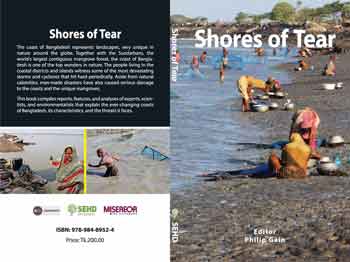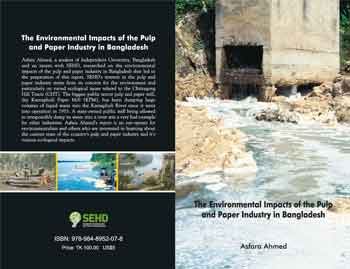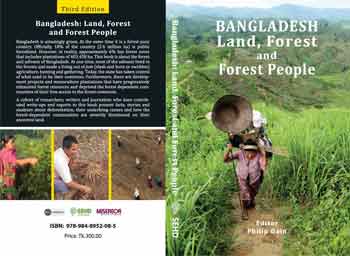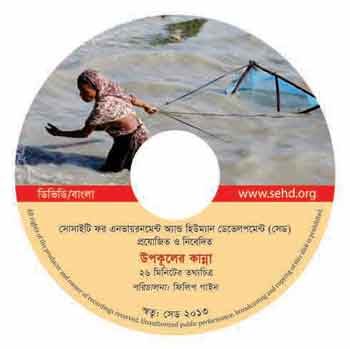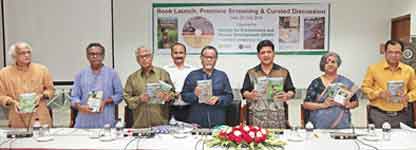
SEHD Launches three new books and one documentary film
SEHD Launched its three new books: (i) Shores of Tear, (ii) Bangladesh: Land, Forest and Forest People (English, 3rd Edition), and (iii) The Environmental Impacts of the Pulp and Paper Industry in Bangladesh and one documentary film, “Shores of Tear” at CIRDAP Auditorium on 29 June 2014. These new production and publications of SEHD present critical insights on some of the key environmental issues of Bangladesh and how we address the climate change issues on the ground.
“We talk about climate change and pay little attention to on the ground situations”
—Dr. Hossain Zillur Rahman
 “Abuse of power is the main factor for environmental degradation,” said Dr. Hossain Zillur Rahman. “We talk about climate change and pay little attention to on the ground situations.” Dr. Rahman, an eminent economist was speaking at the book launch and premiere screening of documentary film of the Society for Environment and Human Development (SEHD) organized in Dhaka on 29 June.
“Abuse of power is the main factor for environmental degradation,” said Dr. Hossain Zillur Rahman. “We talk about climate change and pay little attention to on the ground situations.” Dr. Rahman, an eminent economist was speaking at the book launch and premiere screening of documentary film of the Society for Environment and Human Development (SEHD) organized in Dhaka on 29 June.
Dr. Rahman went further self-critiquing, “We, the economists are confined to a one-way discussion. We have made development philosophy problematic. We must keep in mind that Bangladesh is no more a country of famine. But we need to seriously think which path we take without causing harms to the environment.”
The 26-minute documentary film screened is Shores of Tear directed by Philip Gain. The three books launched are: Shores of Tear, Bangladesh: Land, Forest and Forest People (English, 3rd Edition), and The Environmental Impacts of the Pulp and Paper Industry in Bangladesh. The documentary film and the books, compendium in nature, present facts, anecdotes, images, and analyses on central issues that relate to the state of our shores, forests, and communities living in the forests. These new production and publications of SEHD also present critical insights on how we address climate change issues on the ground.
Prof. Nazrul Islam, former chairman, University Grants Commission (UGC) of Bangladesh was the chief guest at the event. Chaired by Prof. Sakhawat Ali Khan, researchers, scholars, environmentalists, activists and media personalities reflected on different aspects of our shores at risk, degradation of forests and their underlying factors, and environmental impacts of the pulp and paper industry. They based their discussions and reflections on the documentary film and the books.
On SEHD’s three books that have resulted from its years of investigations and research, Dr. Rahman, said, “These books have a common thread and that is to raise important national issues for all. SEHD’s investigation plays an important role for inclusion of local people’s voices and judgment in development philosophy.”
Prof. Anu Muhammad, an economist and an activist in the frontier of resistance movement against environmental degradation in Bangladesh said, “The documentary film and the three books question the contemporary development philosophy. It is in the name of development that military officers, bureaucrats and political leaders have grabbed land in the Chittagong Hill Tracts (CHT) and have introduced rubber, tobacco, other commercial plantations and have pushed for development activities that cause harms to environment. The state laws and the agencies help in continued land grabbing processes. As a result, the indigenous people are evicted from their traditional forest land.”
 Prof. Anu criticized the way the government setting up a coal-fired power plant near the Sundarbans, the largest contiguous mangrove forest in the world. Such plant [in Rampal in Bagerhat district] poses a serious threat to the Sundarbans. To make the situation worse Orion Group, a private company is planning to set up another 565 megawatt coal-fired power plant next to Rampal Power Plant and even closer to the Sundarbans [at Biddarbaon, Mongla) without following environmental rules and regulations.”
Prof. Anu criticized the way the government setting up a coal-fired power plant near the Sundarbans, the largest contiguous mangrove forest in the world. Such plant [in Rampal in Bagerhat district] poses a serious threat to the Sundarbans. To make the situation worse Orion Group, a private company is planning to set up another 565 megawatt coal-fired power plant next to Rampal Power Plant and even closer to the Sundarbans [at Biddarbaon, Mongla) without following environmental rules and regulations.”
Khusi Kabir, a well-known development activist consistently talking about the adverse social and environmental impacts of shrimp aquaculture said, “The people in the coastal districts have been immensely suffering from the adversity of commercial shrimp farming for a long time. The local people have always been struggling to cope with natural disasters that hit the coasts. Commercial shrimp farming on agricultural land and in the mangrove areas have made their struggle tougher.”
In his welcome address, Philip Gain, the director of SEHD, gave an overview of the contents of the books and documentary film. The documentary film “Shores of Tear” highlights the negative environmental and social impacts of shrimp aquaculture in Bangladesh’s coastal regions and documents the work of activists and the local communities to stop this harmful practice. The book, “Shores of Tear”, complies reports, features, and scientific analyses that explain the ever-changing coasts of Bangladesh, its characteristics, and the threats it faces. The book, “Bangladesh: Land, Forest and Forest People (English, third edition)”, enriched with many new reports, stories, and analyses, will help its readers better understand forest related issues as well as the life and struggle of the peoples who still cling to the forests materially, culturally, and psychologically. The other book, “The Environmental Impacts of the Pulp and Paper Industry in Bangladesh” authored by Asfara Ahmed provides a helpful overview of the pulp and paper industry in Bangladesh and its environmental impacts.
In a curated discussion session that followed the launching, a galaxy researchers, writers, media personalities and activists reflected on the art and impacts of research, writing, reporting and documentation on forests and forest communities. Curated by Dr. Tanzimuddin Khan and chaired by Gautam Dewan, Convenor, Movement for the Protection of Forests and Land Rights in the CHT, Philip Gain, Dr. Shapan Adnan, Afsan Chowdhury, Dr. Nirupa Dewan, Ishtiaq Uddin Ahmed, ZuamLian Amlai, Eugin Nokrek, and Shaktipada Tripura shared insightful experience, thoughts and reflections on research and writing done on the forests and forest communities and their impacts during the last few decades.
